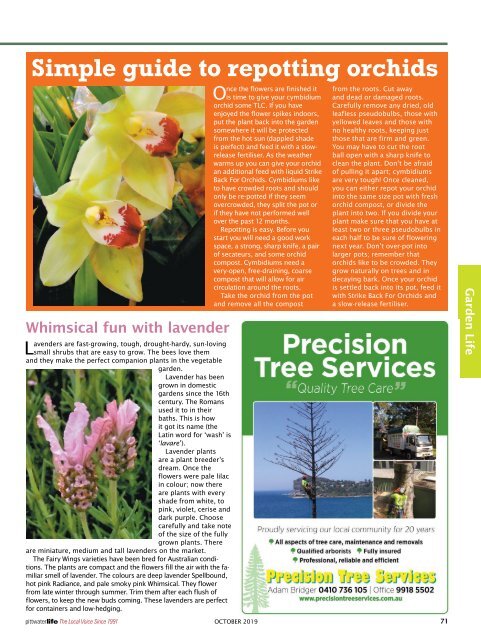Pittwater Life October 2019 Issue
Mental Health Month in Focus. Too Cute! - We Meet Newport's Celebrity Alpaca Capudo. SLSNSW Athlete of the Year. Barry Eaton's Life Between Lives. Plus: Get Ready for Boating Season.
Mental Health Month in Focus. Too Cute! - We Meet Newport's Celebrity Alpaca Capudo. SLSNSW Athlete of the Year. Barry Eaton's Life Between Lives. Plus: Get Ready for Boating Season.
Create successful ePaper yourself
Turn your PDF publications into a flip-book with our unique Google optimized e-Paper software.
Simple guide to repotting orchids<br />
Whimsical fun with lavender<br />
Lavenders are fast-growing, tough, drought-hardy, sun-loving<br />
small shrubs that are easy to grow. The bees love them<br />
and they make the perfect companion plants in the vegetable<br />
garden.<br />
Lavender has been<br />
grown in domestic<br />
gardens since the 16th<br />
century. The Romans<br />
used it to in their<br />
baths. This is how<br />
it got its name (the<br />
Latin word for ‘wash’ is<br />
‘lavare’).<br />
Lavender plants<br />
are a plant breeder’s<br />
dream. Once the<br />
flowers were pale lilac<br />
in colour; now there<br />
are plants with every<br />
shade from white, to<br />
pink, violet, cerise and<br />
dark purple. Choose<br />
carefully and take note<br />
of the size of the fully<br />
grown plants. There<br />
are miniature, medium and tall lavenders on the market.<br />
The Fairy Wings varieties have been bred for Australian conditions.<br />
The plants are compact and the flowers fill the air with the familiar<br />
smell of lavender. The colours are deep lavender Spellbound,<br />
hot pink Radiance, and pale smoky pink Whimsical. They flower<br />
from late winter through summer. Trim them after each flush of<br />
flowers, to keep the new buds coming. These lavenders are perfect<br />
for containers and low-hedging.<br />
The Local Voice Since 1991<br />
Once the flowers are finished it<br />
is time to give your cymbidium<br />
orchid some TLC. If you have<br />
enjoyed the flower spikes indoors,<br />
put the plant back into the garden<br />
somewhere it will be protected<br />
from the hot sun (dappled shade<br />
is perfect) and feed it with a slowrelease<br />
fertiliser. As the weather<br />
warms up you can give your orchid<br />
an additional feed with liquid Strike<br />
Back For Orchids. Cymbidiums like<br />
to have crowded roots and should<br />
only be re-potted if they seem<br />
overcrowded, they split the pot or<br />
if they have not performed well<br />
over the past 12 months.<br />
Repotting is easy. Before you<br />
start you will need a good work<br />
space, a strong, sharp knife, a pair<br />
of secateurs, and some orchid<br />
compost. Cymbidiums need a<br />
very-open, free-draining, coarse<br />
compost that will allow for air<br />
circulation around the roots.<br />
Take the orchid from the pot<br />
and remove all the compost<br />
from the roots. Cut away<br />
and dead or damaged roots.<br />
Carefully remove any dried, old<br />
leafless pseudobulbs, those with<br />
yellowed leaves and those with<br />
no healthy roots, keeping just<br />
those that are firm and green.<br />
You may have to cut the root<br />
ball open with a sharp knife to<br />
clean the plant. Don’t be afraid<br />
of pulling it apart; cymbidiums<br />
are very tough! Once cleaned,<br />
you can either repot your orchid<br />
into the same size pot with fresh<br />
orchid compost, or divide the<br />
plant into two. If you divide your<br />
plant make sure that you have at<br />
least two or three pseudobulbs in<br />
each half to be sure of flowering<br />
next year. Don’t over-pot into<br />
larger pots; remember that<br />
orchids like to be crowded. They<br />
grow naturally on trees and in<br />
decaying bark. Once your orchid<br />
is settled back into its pot, feed it<br />
with Strike Back For Orchids and<br />
a slow-release fertiliser.<br />
OCTOBER <strong>2019</strong> 71<br />
Garden <strong>Life</strong>

















